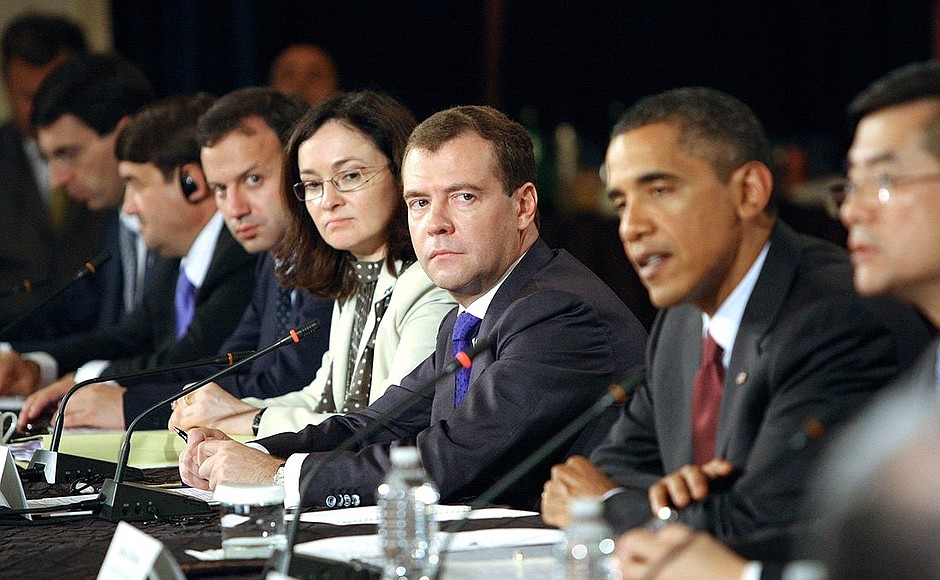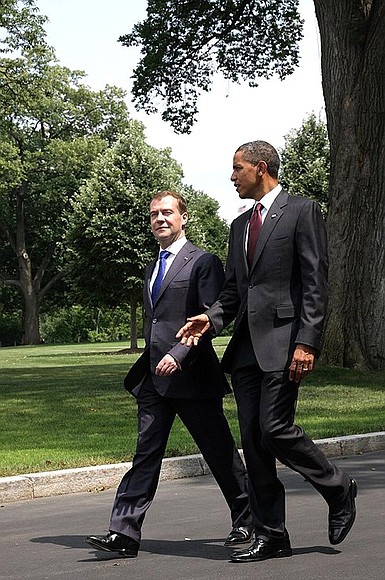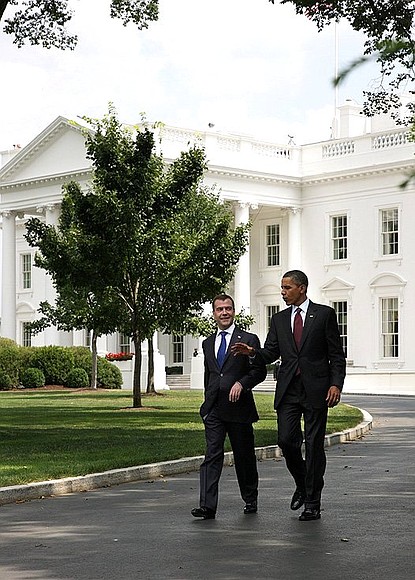President of The United States Barack Obama: Well, good afternoon, everybody. It is a pleasure to be here with my friend and partner, President Medvedev, and I want to thank him again for his leadership, especially his vision for an innovative Russia that’s modernising its economy, including deeper economic ties between our two countries.
I want to thank the leaders who are guiding the discussion today – my Commerce Secretary Gary Locke and Minister Nabiullina. I always have a little trouble with that one. They say the same thing about Obama. We are joined by our United States Trade Representative, Ambassador Ron Kirk, and our great ambassadors John Beyrle and Sergei Kislyak.
And I want to also thank the US Chamber of Commerce, the US–Russia Business Council, the American Chamber of Commerce in Moscow, and all the organisations who helped bring our countries together not just today but every day.
Many of you joined us at the business summit during my visit to Moscow one year ago, and it is good to see you again. I noted then that you’re part of a long tradition of commerce and trade between our peoples. Long before Russia and the United States even exchanged ambassadors, we exchanged goods.
In fact, before coming to Washington, President Medvedev visited California and Silicon Valley to explore new partnerships in science and technology and in venture capital. And while there, he pledged Russia’s support to preserve the historic Fort Ross in Sonoma County – an enduring reminder of the early Russian settlements and trade that brought Russian goods to our young nation.
Some have even wondered whether our Declaration of Independence may have been signed with goose quills from Russia. More than 200 years later, it’s a sign of the times that during his visit to Silicon Valley, President Medvedev opened his own Twitter account. I have one as well. And I said during our press conference today that we may be able to finally get rid of those old “red phones.” (Laughter.)
As we all know, despite the surge in trade in recent years, the economic relationship between the United States and Russia is still largely one of untapped potential. And I pointed out last year that our trade with Russia is only about the same as our trade with Thailand – a country with less than half the population of Russia. So obviously there’s more work to do.
That’s why part of the reset of the US-Russia relationship required us creating the US-Russia Bilateral Partnership Commission – Presidential Commission – to explore a whole range of new opportunities, including economic partnerships that create jobs and opportunities for both our peoples. And under Secretary Locke and Minister Nabiullina’s leadership, that’s what we have done.
Companies represented here today are moving forward with a series of major trade and investment deals that will create jobs for both Americans and Russians across many sectors, from aerospace, to automotive engineering, to the financial sector and high-technology.
I am especially pleased that Boeing and Russian Technologies are moving forward with a $4 billion deal on 50 Boeing 737s. This is a win for Russia, creating a long-term market for its raw materials and resulting in modern airplanes for Russia’s travelers.
It’s obviously a win for the United States, because this partnership could add up to 44,000 new jobs in the American aerospace industry. This reflects my administration’s National Export Initiative, and it’s a perfect example of the shared prosperity — and the high-tech jobs that we can create together.
So today, President Medvedev and I agreed to expand trade and commerce even further. We agreed to deepen our collaboration on energy efficiency and clean energy technologies. We reached an agreement that will allow the United States to begin exporting our poultry products to Russia once again. Chicken is important. (Laughter.)
I want to again thank President Medvedev and his team for resolving this issue, which is an important signal about Russia’s seriousness about achieving membership in the World Trade Organisation. And that’s why I told President Medvedev that our teams should accelerate their efforts to work together to complete this process in the very near future.
I believe that Russia belongs in the WTO. That’s good for Russia. It’s good for America. And it is good for the world economy.
I pledged to President Medvedev that the United States wants to be Russia’s partner as he pursues his vision of modernisation and innovation in Russia, including his initiative to create a Russian Silicon Valley outside of Moscow. American companies and universities were among the first to invest in this effort. And I’m pleased that a number of you here today are going to be working with it as well.
Now, there’s still a lot more that we can do to encourage trade and investment. And obviously in Russia – and President Medvedev and I discussed this – issues of transparency and accountability and rule of law remain absolutely critical. This is the foundation on which investments and economic growth depend. And I very much appreciate and applaud President Medvedev’s efforts in this area.
Today, we took another step forward. Our two governments are making a joint commitment to open government that fosters transparency and combats the corruption that stifles economic growth.
Of course, ultimately, it’s you – the private sector, our entrepreneurs – who create jobs and unleash economic growth. It’s the market that’s been the most powerful force in history for creating opportunity and prosperity. It’s not the resources we pump or pull from the ground. It’s the imagination and the creativity of our people, our workers, and their dreams for themselves and their children that ultimately drives the modern economy.
Last year in Moscow, I learned a Russian proverb, which says, “Every seed knows it’s time.” A year ago, we planted a seed of cooperation and commerce. And today, that cooperation is bearing fruit – with new partnerships and prosperity for both our peoples. And I think that if we stay on the course that we’re on, with a spirit of mutual respect and mutual interest, we are going to make even more progress, sell more goods, create more jobs, get more cross-border financing than ever before.
So, President Medvedev, welcome. Thank you to all the business people who are visiting here from Russia and your ministers. Thank you for your vision and your determination to continue to move us towards a brighter vision of our future.
Thank you.
President of Russia Dmitry Medvedev: Ladies and gentlemen, colleagues,
A year has gone by now since the last time we met to discuss business affairs. A lot of water has passed under the bridge since then, as they say. There are several differences between this meeting and the last meeting in Moscow. For one, it is hotter here, and this makes it harder to work. But here we are seated, while in Moscow the President and I were standing, so in this sense it makes work easier. That’s a big difference.
Speaking seriously, however, a lot has changed over this past year. The global economy has changed. We have all been working tirelessly to get our countries’ economies back on track and fix breakdowns in the global economy, and some of you have been busy simply saving your own businesses. Overall these efforts have been successful, though not without problems.
The President and I discussed a very diverse range of issues today. I will be flying to the G20 summit practically right away after this meeting and the visit to Congress. Tomorrow the economic discussions will continue at the G8 summit, and even more so at the G20 summit, where we will all be looking at how to build a better future. Our future also depends in large part on the bilateral relations that we forge with each other, the relations we build with our various partners, and this includes the relations between Russia and America.
The agenda for this visit to the United States has turned out very busy and interesting. This was the first time that I visited not only New York or Washington, but went to California too. Of course, everything I saw there made a very big impression. Part of the Russian delegation was there with me and we all looked at how business in Silicon Valley is organised. As I said at the news conference, we have plenty to learn from you here, and I hope that these contacts will create new opportunities that will help us to carry out the modernisation agenda we have proposed for Russia – the programme for modernising our economy in accordance with the five presidential priorities that we have set and are working on now. These priorities are medicine, energy efficiency, nuclear technology, computer technology, and space programmes.
We have launched plans to build a truly new innovative development centre in Skolkovo near Moscow, and we hope very much to make use of US experience in our country, making the necessary adjustments of course. I am very grateful to the American businesspeople who have expressed a desire to work with us on this project and have taken some responsible decisions. We appreciate this and will of course do everything possible to give you the most comfortable and best protected environment for this work.
With regard to our Silicon Valley, the Skolkovo project, let me note in passing that we have taken what for Russia is quite an unprecedented step of giving this project a special legal status. I have already submitted a special law on this, which provides for specific tax holidays and other specific provisions aimed at creating the best possible conditions for this project.
We believe that Russian-American relations have very great potential. But the crisis and the difficulties that our countries experienced in their relations at one point have stopped us from developing this potential as actively as we could have. I think that total investment as it stands now is not up to today’s needs. Of course we would like to see more American investment in the Russian economy and more Russian investment in the American economy too, since investment cannot be a one-way street. We live in a global economy, after all, and so we need to establish reasonable rules and help each other overcome the various obstacles that arise.
We have signed a whole series of documents of late. Russia recently held an economic forum, at which agreements were signed between Russian and American companies. Here too we saw documents signed, and this is all a good sign. I am sure that my counterpart, President Barack Obama, and I will keep watch over this process and help it along, because I believe that this is a very important part of relations between countries. We will carry out this work personally, and through the Presidential Commission that was set up a while ago and is now gathering pace in its activities. We place big hopes on the Russian-American business dialogue that began two years ago. Participants in this dialogue are here today. I am pleased that we have the chance to discuss these subjects today and that, in the end, our joint projects will help us to overcome the problems that our countries and the global economy have encountered over these last years.
There is still a great deal to do. This will require a big international cooperation effort and improvements in national laws. President Obama is very much engaged in this work now, and we understand this process very well and are very much aware of just how difficult an undertaking this is, all the more so when all decisions of this kind have not only their supporters but also their opponents, ready to criticise them.
It is clear, however, that the global economy and the world in general have changed, and so we need to change the rules of the game accordingly, even though all of you here are committed to modern economic approaches and the free market. But we need to realise that we are living in a new century in which the global nature of economic developments requires us to increase our cooperation from one year to another. I am confident that we have bright prospects ahead, and I am pleased that we have this chance to meet once again to discuss the future for relations between Russian and American business. Thank you.


